For masters swimmers, focus on three key nutrition strategies: consume 1.2-1.5g protein per kg body weight daily to combat age-related muscle loss; time your recovery nutrition within 30-60 minutes post-workout with 20-40g protein and complex carbs; and stay properly hydrated with electrolyte-enhanced fluids before, during, and after training. These approaches help maintain performance, support recovery, and enhance longevity in the sport. Discover how these strategies can specifically transform your swimming experience.
Energy Balance for Aging Athletes
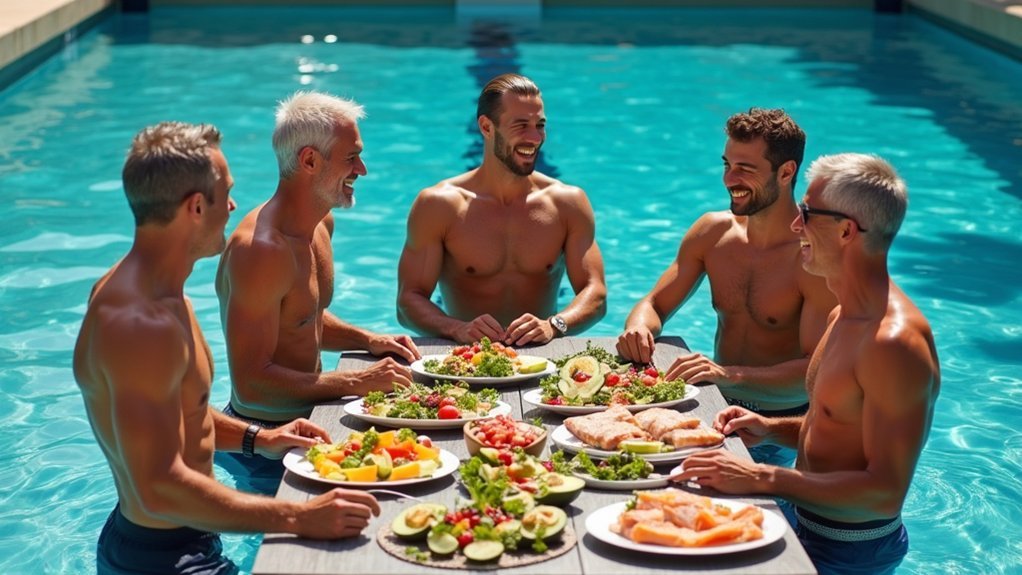
As you age, your body’s relationship with energy undergoes significant transformation. Your daily energy expenditure declines faster than your natural reduction in food intake, creating a potential imbalance that affects performance and body composition.
Aging creates an energy mismatch where metabolism slows more rapidly than appetite naturally diminishes.
Between ages 30 and 80, your resting metabolic rate may decrease by 13-20%, largely due to lost muscle mass. To counter this, you’ll need to make strategic adjustments to both your diet and activity levels.
Aim for 1.2-1.5 grams of protein per kilogram of body weight to support muscle maintenance. Combating the anabolic resistance that develops with age requires consistent protein intake spread throughout the day. Regular swimming sessions help maintain higher energy expenditure while strength training preserves lean mass and enhances metabolic rate.
Focus on nutrient-dense foods that satisfy your reduced caloric needs while providing essential nutrients for recovery and performance.
Recovery Nutrition for Masters Swimmers
While your swimming workout may end when you exit the pool, your body’s recovery process is just beginning. To maximize recovery, consume nutrients within 30-60 minutes post-workout. This vital window helps replenish glycogen stores and jump-starts muscle repair. A specially formulated recovery drink mix designed in coordination with U.S. Masters Swimming provides an ideal combination of nutrients for swimmers after practices of 60 minutes or longer.
| Nutrient Type | Recommended Amount | Benefits |
|---|---|---|
| Protein | 20-40g (3-5g leucine) | Stimulates muscle protein synthesis |
| Carbohydrates | Complex sources | Replenishes glycogen, enhances insulin response |
| Electrolytes | Sodium, potassium, magnesium | Restores fluid balance, prevents cramping |
You’ll experience less fatigue and better preparation for your next session with proper recovery nutrition. For masters swimmers over 60, this becomes even more important as your body’s recovery mechanisms slow down. Adjust your strategy based on your age and training intensity to prevent cumulative fatigue.
Supplement Strategies to Support Performance and Health
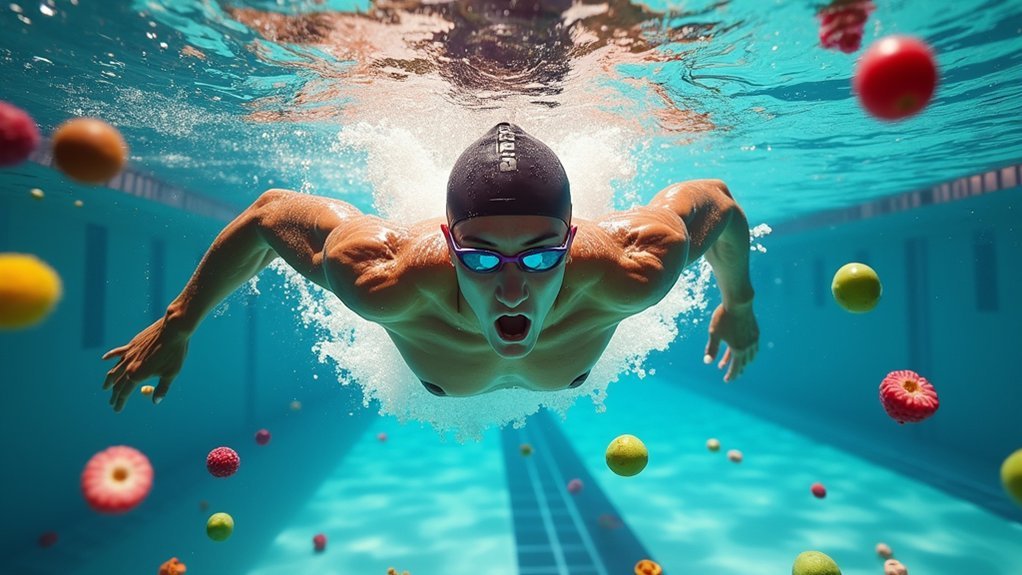
Four key supplement categories can markedly impact a master swimmer’s performance and recovery. When implemented strategically, these supplements address your unique physiological needs as an aging athlete.
- Ergogenic aids like caffeine, beetroot juice, creatine (3-5g daily), and beta-alanine enhance performance by improving blood flow, delaying fatigue, and boosting power output for sprints. Always remember that third-party certifications provide important verification of supplement purity and safety for competitive athletes.
- Hydration formulas with electrolytes prevent cramping and maintain nerve function during intense training, while glucose provides immediate energy.
- Protein supplements support muscle repair when dietary intake falls short, with hydrolyzed forms offering faster absorption post-workout.
- Micronutrients deserve special attention—particularly vitamin D for indoor swimmers and antioxidants (vitamins C and E) that neutralize training-induced free radicals.
Frequently Asked Questions
Can Masters Swimmers Benefit From Intermittent Fasting Training Regimens?
Yes, you’ll likely benefit from intermittent fasting as it improves metabolic health, enhances fat utilization, and may support recovery. However, you’ll need to time meals around intense workouts to maintain performance and adequate nutrition.
How Does Caffeine Timing Affect Masters Swimmers’ Performance?
Timing your caffeine intake 45-60 minutes before swimming optimizes your performance. You’ll benefit most when it peaks during competition. For longer events, you might need additional doses to maintain alertness and reduce fatigue.
Should Masters Swimmers Follow Different Nutrition Strategies During Taper Periods?
Yes, you’ll need modified nutrition during taper. Maintain your macronutrient ratio but reduce overall intake proportional to decreased training. Don’t try new foods, focus on quality protein, and guarantee you’re properly hydrated throughout this period.
Are Plant-Based Diets Adequate for Aging Competitive Swimmers?
Yes, plant-based diets can adequately support your needs as an aging competitive swimmer when you’re careful to include sufficient protein, B12, omega-3s, iron, zinc, and calcium while monitoring caloric intake for performance demands.
How Does Alcohol Consumption Impact Recovery in Older Swimmers?
Alcohol undermines your recovery by reducing testosterone, impairing protein synthesis, causing dehydration, disrupting sleep quality, and increasing inflammation. It’ll slow muscle repair and decrease energy availability for up to 72 hours post-consumption.
In Summary
As you navigate your masters swimming journey, remember that maintaining energy balance, prioritizing recovery nutrition, and selecting targeted supplements aren’t just performance strategies—they’re investments in your longevity in the sport. You’ll recover faster, perform better, and enjoy swimming more when you’ve tailored your nutrition to your aging body’s specific needs. These practical approaches will keep you competitive and healthy in the water for years to come.

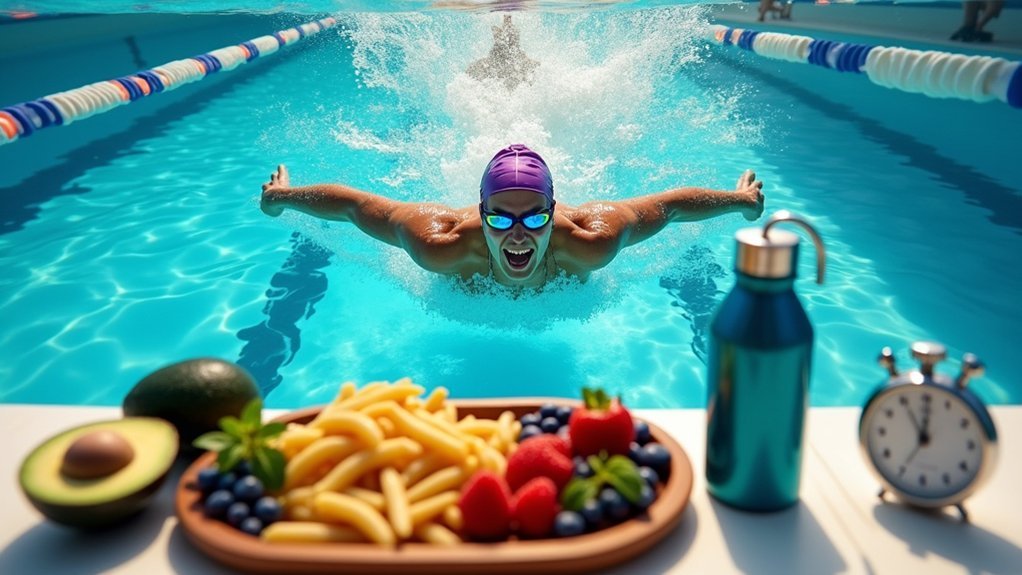
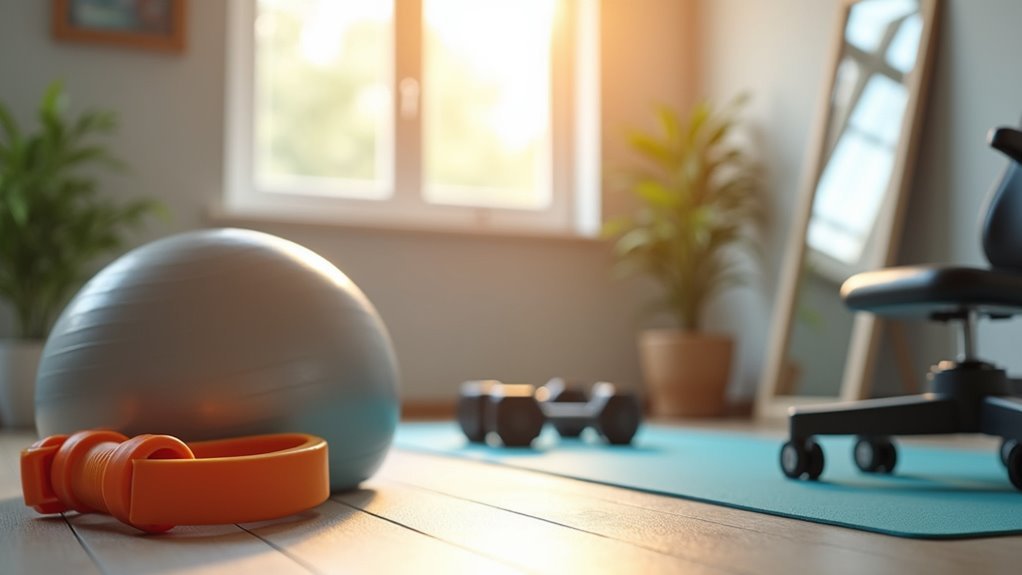
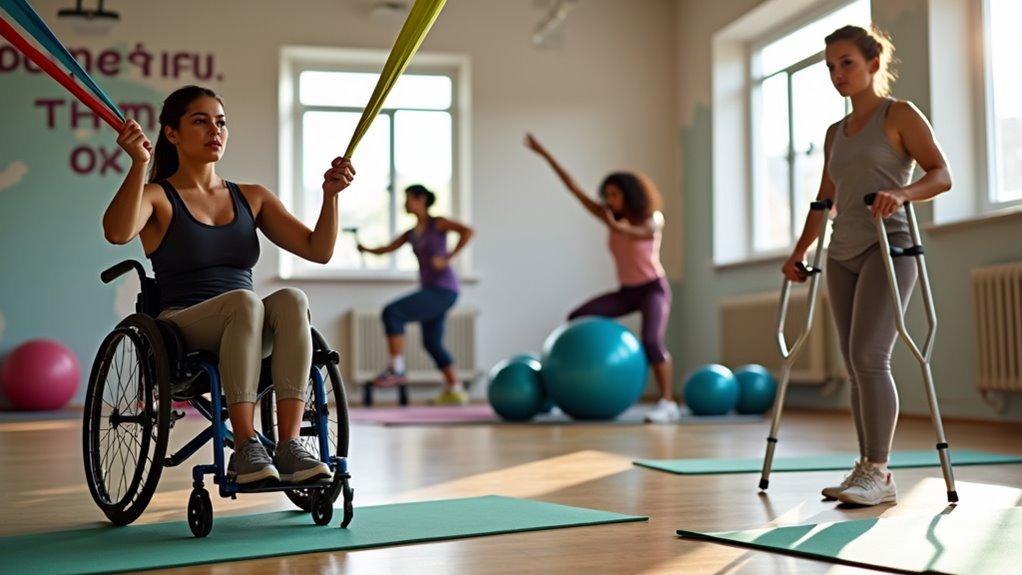
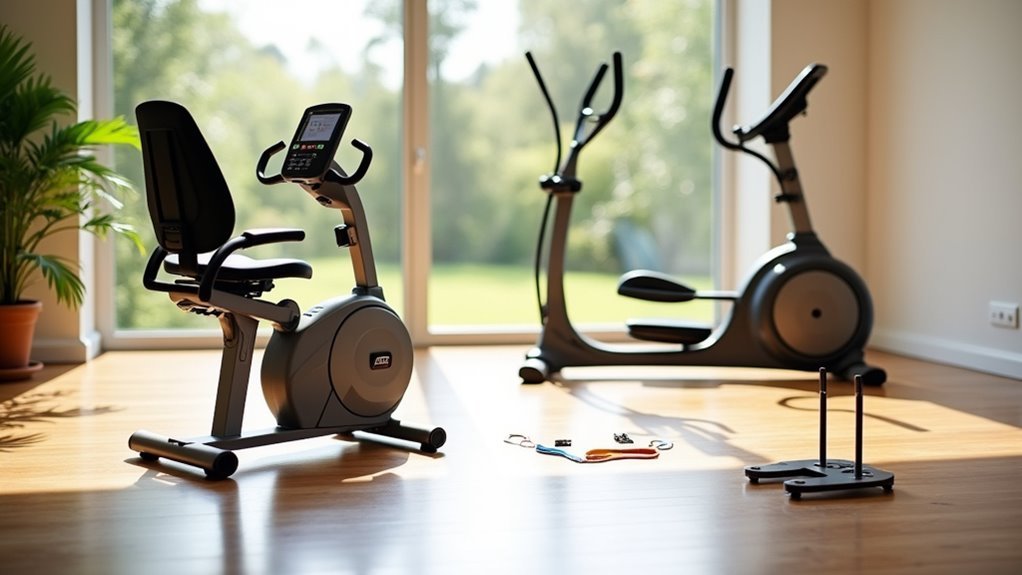
Leave a Reply